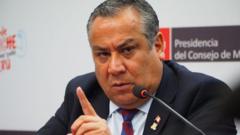Prime Minister Gustavo Adrianzén of Peru has resigned just hours before he was set to face a no-confidence vote in Congress, an event fueled by outrage over the kidnapping and murder of 13 mine workers that has left the nation in shock. His resignation marks a significant setback for President Dina Boluarte, whose disapproval ratings have taken a hit amid rising crime rates throughout the country.
Adrianzén's departure represents a challenging moment for Boluarte, making him the third prime minister to exit her administration, thereby necessitating the replacement of her entire cabinet. According to Peru's constitution, the resignation of a prime minister mandates the resignation of all ministers, leaving the president tasked with reassigning new appointments once a successor is named.
This event unfolds against a backdrop of political instability following recent incidents that have amplified public dissatisfaction. Boluarte had only just reshuffled her cabinet earlier in the day, appointing new ministers to vital departments such as finance, interior, and transport. Ironically, these newly appointed officials will now also have to resign posthaste.
Public sentiment against Boluarte intensified as protests erupted across the country. Citizens have taken to the streets, clad in white and demanding urgent governmental action to combat spiraling crime rates, extortion, and targeted killings. The protesters carried banners proclaiming "no more deaths," highlighting the urgency of their demands for safety and security.
Recent events have seen a rise in violent crime, with gangs exerting pressure for extortion payments from businesses, including those operating in transportation. Peru now grapples with the complexity of governance amid calls for justice and effective strategies against rising criminality.




















